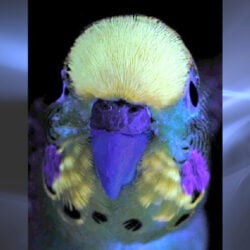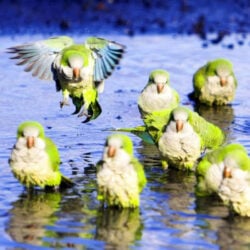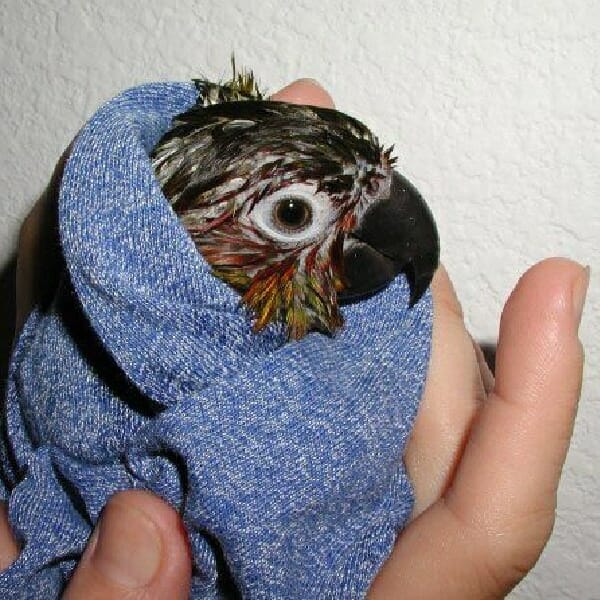Last Updated on by Mitch Rezman
As you read this, the conflict between the Hatfields and the McCoys is probably still raging but in keeping up with the times it probably sounds something like “Hey Edgar McCoy, stay off my Facebook page or my family will hashtag you with some really bad stuff” tagged Ralph Hatfield – 18 likes – two shares – or something like that.
And so the debate rages about how a seed diet is bad for birds. Pellets are the only thing you should feed your birds, saving seeds only as treats is something that I read a lot on the Internet – so must be true. Tell that to the parrots who for generations in the rainforest never once fed off the Mystical Magical Pellets tree.
We’re not here to tell you how to feed your African gray. The bird is alive so it must be eating, we just want to make sure you have the right nutrition goals.
I mean the argument begs the question, knowing parrots have been around for millions of years how did they survive evolution into the 20th century (presumably when pellets were invented) without pellets?
Look, the two biggest knocks on seeds are “they are fatty and will possibly cause fatty liver disease” and “sure it says vitamin-fortified on the label but the vitamins are sprayed on the seeds and when the bird takes the husks off, the husk carrying the vitamins fall to the floor of the cage doing the bird no good”.
We also hear that “I want to make sure my bird is getting a lot of variety so I serve a lot of fresh fruit and vegetables” Which is great. One of the problems with that is if you leave your bird with anything fresh and you go to work for eight or 10 hours, but the time you get home the said fruit is not so fresh anymore.
You can’t say this about a lot of bird foods but Lafeber Nutriberries and Avi-cakes fix all of this.
There is a flavor and a size for any bird from a parakeet to a greenwing macaw.
Parrots have incredible beak abilities; just look at the way your macaw or cockatoo can take a chunk out of your finest furniture and, moments later, take the hull off of a tiny seed. A parrot’s curiosity is often driven by the quest for different tastes and textures, so why not give your bird something he can really sink his beak into?
Avi-Cakes is a blend of 50-percent premium seeds and 50-percent nutritionally balanced pellets held together with a great-tasting molasses binder. Its square shape is designed as the perfect “work-and-chew-food” for your macaw or cockatoo to hold, pull, twist and crunch to bring out his foraging instincts. Your parrot might pick and choose his way through a loose seed mix, but he’ll tear into Avi-Cakes and consume better nutrition along the way. Avi-Cake nutrition matches that of most pelleted diets and can be fed as a main meal. It is also an ideal “bridge” food to wean your parrot off of seeds and onto pellets, as many parrots start to eat pellets after eating Avi-Cakes.
“Avi-Cakes is Omega 3 & 6 balanced to promote a healthy immune system and improve skin and feather quality, as well as naturally preserved and flavored. All the seeds and grains in Avi-Cakes are hand-inspected for cleanliness and freshness. Our equipment has been specially designed for just making bird food. We make small batches of food to ensure the best quality possible. Each batch is laboratory tested. Finally, each Avi-Cake is hand-packed. It takes a lot of work to make a great product, but we believe the results are worth it!”
“Work ‘n Chew”™ food
- Nutritionally complete
- Omega 3 & 6 balanced
- Excellent foraging food
- Naturally preserved
- Naturally flavored
- Great meal or treat
- Excellent conversion food
From the Lafeber website – Nutri-Berries – Information for Vets
The key difference between pellets and Nutri-Berries is that all of the ingredients in a pellet are finely ground. Nutri-Berries are full of textures and shapes that promote beak and foot play.
Complete nutrition made irresistibly
With Nutri-Berries, good nutrition is rolled into a fun-to-hold shape. The round “Berrie” stimulates beak and foot manipulation, and real pieces of vegetables and fruit also encourage birds to play with their food.
• Classic Nutri-Berries contain crunchy whole grains & seeds that birds enjoy
• Sunny Orchard Nutri-Berries contain apricots, raisins & cranberries
• Garden Veggie Nutri-Berries contain carrots, peas, broccoli, corn
• Tropical Fruit Nutri-Berries: Papaya, pineapple
• El Paso Nutri-Berries: Bell peppers, chili powder
Backed by research
In a scientific study performed at the University of California at Davis School of Veterinary Medicine, cockatiels were fed pellets or Nutri-Berries. Birds on Nutri-Berries were found to spend twice as much time in foraging or feeding-related activities when compared to those fed pellets.
Avian veterinarians agree that a diet that provides mental and physical stimulation improves the quality of life while minimizing stereotypical behaviors like feather destruction or repetitive movements.
The nutritional alternative to pellets. Lafeber’s Nutri-Berries are nutritionally complete just like pellets.
• Pellets are created by grinding seeds and grains. Vitamins, minerals, and amino acids are then added to create a nutritionally balanced mixture that is pressed into a homogeneous “pellet” shape.
•Nutri-Berries are a mixture of whole grains and hulled seeds blended with pellets. Nutri-Berries are coated with amino acids, stabilized vitamins, and chelated minerals. Nutri-Berries are also omega 3:6 balanced and naturally preserved.
Author Profile
Latest entries
 Bird BehaviorJune 13, 2025Why Do Some Parrots Struggle in Captivity?
Bird BehaviorJune 13, 2025Why Do Some Parrots Struggle in Captivity? Bird & Parrot AnatomyJune 12, 2025Why are Budgerigars Called The Colorful Parrots?
Bird & Parrot AnatomyJune 12, 2025Why are Budgerigars Called The Colorful Parrots? Bird & Parrot AnatomyJune 12, 2025How Do Monk Parakeets Talk to Each Other?
Bird & Parrot AnatomyJune 12, 2025How Do Monk Parakeets Talk to Each Other?  Bird BehaviorJune 10, 2025How Cockatoos Learned to Use Drinking Fountains Like People
Bird BehaviorJune 10, 2025How Cockatoos Learned to Use Drinking Fountains Like People



